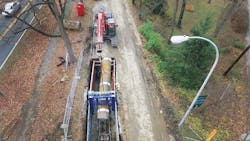About the author: Joy Carter is communications manager for American Cast Iron Pipe Co. Carter can be reached at [email protected] or 205.325.4735.
Louisville Water Co., the utility for Louisville, Ky., has announced that Phase I of the Eastern Parkway Project to install 2.2 miles of 42-in. spiral-welded steel pipe is complete. The three-phase project, which began in November 2016, will replace a total of more than 6 miles of water pipeline originally installed between 1923 and 1930.
“This is the largest pipe replacement project in Louisville Water’s 156-year history,” said Michael Meyer, project engineer at Louisville Water. “An innovative solution allowed us to repair one of our critical supply lines without interrupting water service for thousands of people.”
Costly Upgrades
In 2016, the utility set aside $21 million for system upgrades.
“Louisville is to be commended for its foresight and investment in the city’s water system,” said Jim Watterson, district sales manager for American SpiralWeld Pipe. “This funding and efforts to refurbish pipelines is smart business. It will guard against major water losses and service interruptions and, in the long run, save money.”
The water main runs along a historic, heavily traveled road. To minimize environmental impacts and neighborhood disruptions, the utility opted to install the pipe using an installation method known as slip lining.
Using this method, installers slipped, or pushed, the 42-in. spiral-welded steel pipe into the original 48-in. pipe, then cement-grouted between the two pipes.
“Compared to digging an open trench to replace the pipe, slip lining does not disturb the surface, making it ideal for historic areas like this one,” Watterson said.
Drone video footage demonstrating the slip lining installation process can be seen on American’s website. Phase II is scheduled to begin in November 2017;
Phase III will begin in November 2018. Completing the project in phases during winter months, when water demand is lower and service can more easily be rerouted through other lines, will help ensure minimal impact to customers.
Ahead of the Curve
Louisville is among many municipalities across the country confronted with an aging water system. The utility began operations in 1860, and some of its water mains date back to 1868. Recently, the American Society of Civil Engineers (ASCE) released its 2017 Infrastructure Report Card, giving the nation’s drinking water infrastructure a D. The infrastructure is in poor to fair condition and mostly below standard.
“Every four years, ASCE releases its infrastructure report card, a valuable assessment that helps focus attention on the need to maintain our infrastructure,” said Maury Gaston, engineer for American Ductile Iron Pipe. “Much of our country’s water infrastructure, like the iron pipe Louisville is upgrading in its system, was installed in the early 1900s, buried and forgotten. After a century of reliable service, it’s time to assess it and improve it.”
Louisville Water began assessing and improving its infrastructure more than 40 years ago, and today its condition assessment and water main repair and replacement program is considered an industry model. Since the 1980s Louisville Water has dedicated capital funding to inspect, replace and repair water mains on an annual basis. The utility now uses a systematic approach that looks at main break frequency, traffic, customer impact and leaks to prioritize work.
Unlike other infrastructure, such as roads, where needed repairs are visible, most water infrastructure is underground—out of sight and out of mind.
“It is a testament to the strength and durability of iron pipe, but we can no longer afford to overlook the need for significant improvements in our water system,” Gaston said. “Sustainable and environmentally conscientious spiral-welded steel and zinc-coated ductile iron pipe provide excellent solutions for the next century and beyond.”
The cost for such upgrades is daunting. The American Water Works Assn. estimates at least $1 trillion is needed to meet water infrastructure needs.
“Farsighted utilities like Louisville Water are going to the mat to find the funding to make the major investment needed to protect their drinking water supply,” Gaston said.
